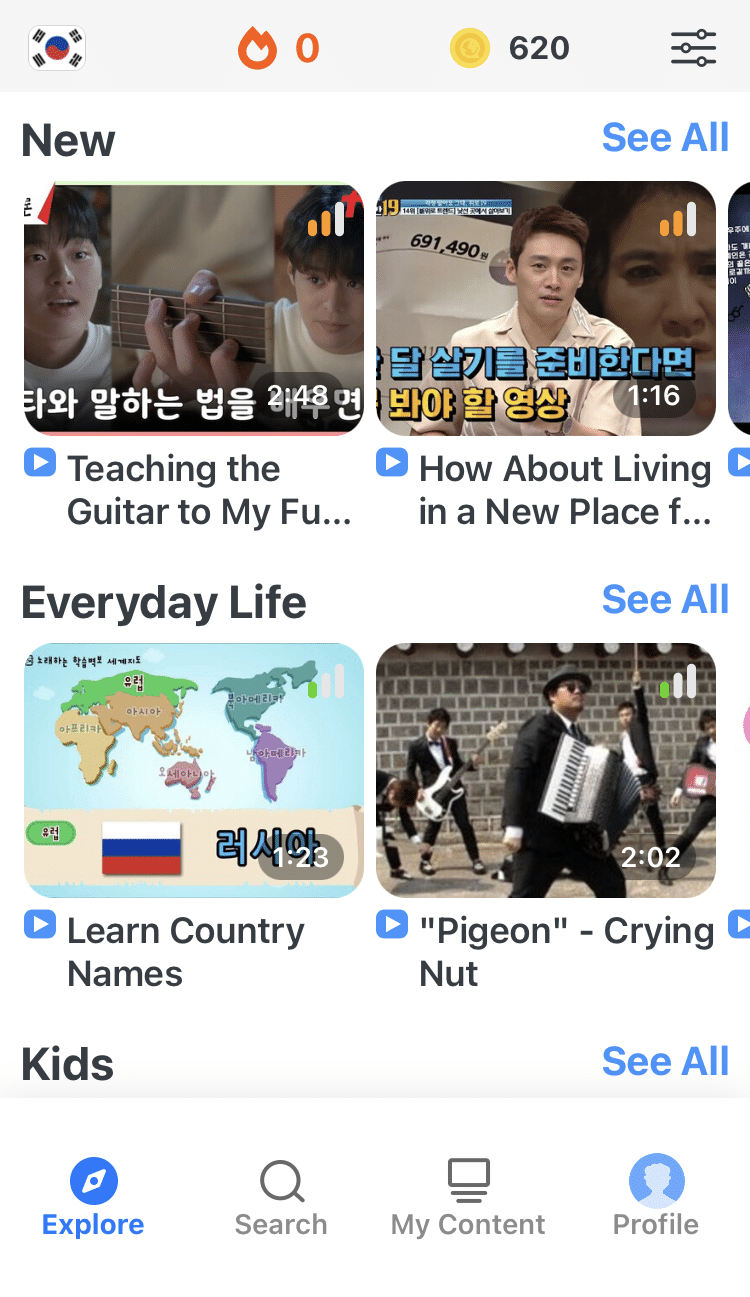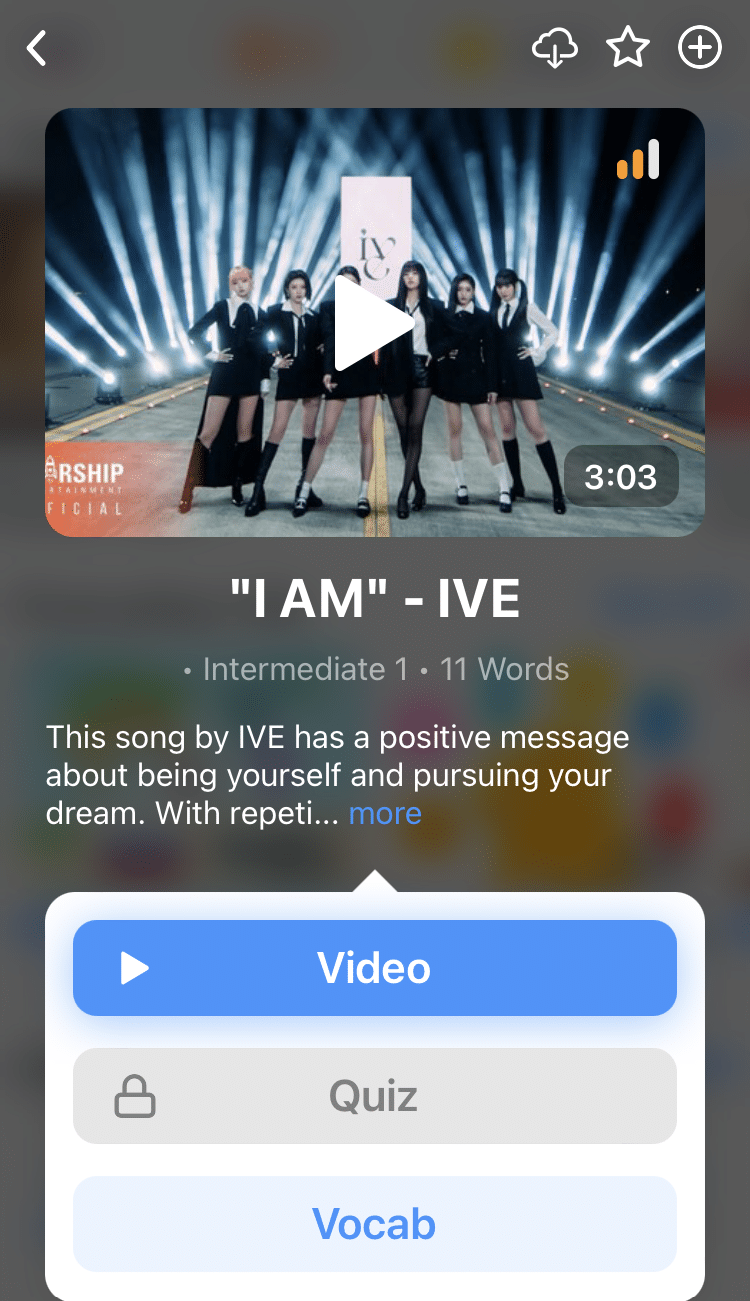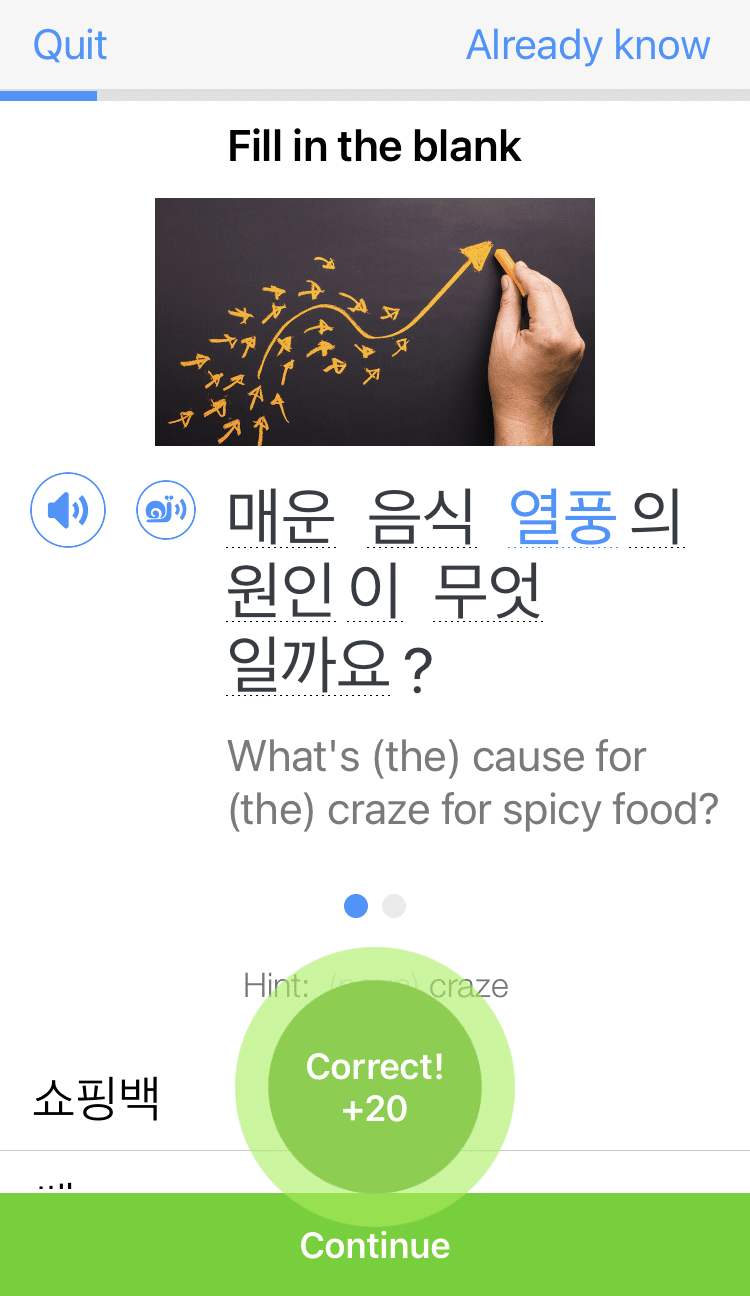
36 Korean Songs that Are Easy to Sing for Language Learners
Modern Korean culture is rich with colorful, lively songs for getting your singing groove on.
Aside from Korean movies, K-dramas and fun videos, getting into Korean songs might be the most fun way to teach yourself the language.
Music in Korean is 음악 (eu-mak), while songs are called 노래 (no-rae). 가요 refers to popular Korean songs and includes classics from the past decades.
Here’s a roundup of some of the best easy Korean songs to sing. There are K-Pop and traditional songs included and you might find your new favorite 가수 (singer)!
Contents
- Learn Korean with Songs from K-Pop Girl Bands
- Songs in Korean from K-Pop Boy Bands
- Easy Korean Songs from Solo Female Artists
- Easy Korean Songs from Solo Male Artists
- Easy Folk and Children Korean Songs to Sing
- What Makes a Korean Song Easy to Understand?
- A Step-by-Step Guide for Learning Korean with Songs
- And One More Thing...
Download: This blog post is available as a convenient and portable PDF that you can take anywhere. Click here to get a copy. (Download)
Learn Korean with Songs from K-Pop Girl Bands
1. “Attention” — New Jeans
For easy songs to sing in Korean, the girl group New Jeans is the best place to start. The songs are dreamy, melodic and not super complicated. Most of their songs also have a mix of both Korean and English lyrics.
This song in particular is about how it feels when you’re around someone you like. You’ll learn informal vocabulary about wanting attention from your crush, but also the confusion that comes along with liking someone.
2. “Antifragile” — Le Sserafim
If you’re looking for an upbeat girl power song instead, check out the song “Antifragile” by Le Sserafim. Fun fact: the band name is anagram of the phrase “I’m fearless” and also refers to the angelic beings seraphim.
You’ll learn words and phrases about self-empowerment and end up hyping yourself up in the process! There are some unusual beats and rap parts, but the lyrics repeat themselves a few times throughout the song.
3. “Next Level” — aespa
Here’s another girl power song that had such a hold on South Korea that there was a time you would hear it in every store while shopping. Aespa’s main aesthetic and concept is cyberpunk sci-fi which you can see in this music video.
The lyrics are about the group’s travel fictional universe to defeat evil, so perhaps not the most useful in daily life! However, luckily it’s an easy one to sing and you’ll be able to impress your friends at karaoke.
4. “TT” — Twice
At the time it came out in 2016, “TT” by Twice set the record for the fastest views for any K-pop group.
“TT” refers to the crying emoticon in which the horizontal line in “T” is the eye, and the vertical line in “T” is the stream of tears. She’s crying from her two eyes, so she’s “just like TT.”
In addition to this short lesson in Korean text expressions, Korean learners could take away rules about sentence structure and grammar. The material is best suited for intermediate language learners.
5. “Lonely” — 2NE1
With artistic videos à la Lady Gaga, Korean style, 2NE1 is one of the most notoriously unconventional Korean girl groups.
“Lonely” is about a girl who’s decided to move on from her relationship. She’s feeling lonely and sad about hurting her former beloved but realizes that she needs to pick herself back up.
This song will teach you a lot of idioms and structures to express confusion and uncertainty. The lyrics also incorporate various ways of conveying one’s personal opinion as well as verbs to convey different feelings.
6. “아파” (It Hurts) — 2NE1
The title itself is a must-know term, but the rest of the song is also rich with learning potential. 2NE1 provides a reflective account of an individual wondering about the state of one’s ex-lover.
The speaker laments how much they have changed and wishes for a reunion, though it seems that the pain from the breakup is one-sided.
Much of the song’s theme of loneliness is portrayed as questions, so the lyrics can teach you the elements of how to ask questions in Korean, and hear idioms and expressions.
7. “I Don’t Care” — 2NE1
We’re moving on from love songs and picking up the pace again with this one. The melody is quite catchy and you’ll find yourself swaying to the beat. It’s about acting like you don’t care when you want to teach your lover a lesson.
This is one of those songs that could use some dance moves or some strikingly clever hand gestures. Those would really help you more efficiently absorb the vocabulary contained in this song.
8. “BBoom, BBoom” — Momoland
The nine-member girl group Momoland debuted in 2016 and found themselves at the top of K-pop charts—in large part due to their hit “BBoom, BBoom.”
The title refers to the sound a heart makes when your crush approaches you. The words make up relatively easy sentences that any novice can learn. For example, if you want context to learn body parts in Korean, then you’ll get a kick out of this song.
9. “여자 이니까” (Because I’m a Girl) — KISS
This is the ultimate tearjerker if ever there was one. The song’s about a young woman who met a dashing photographer, fell in love with him and ended up blind and with a broken heart.
Actually, the song is so much more than that, but I would deprive you of the full experience if I revealed the agonizing twist.
“Because I’m a Girl” readily lends itself to study by language learners. It’s a moderately paced ballad that hooks you with a wonderful story and setting for learning a good deal of Korean words and phrases.
10. “Nobody” — Wonder Girls
Released in 2008, Wonder Girls’ “Nobody” is considered a classic, in K-pop terms. It was one of the first K-pop songs to break into the American music scene, proving that Korean content could go toe-to-toe with American music.
The song’s music video is a memorable one with a 50s theme. It has some catchy beats and is ideal for Korean learners who are absolute beginners as the song has easy lines throughout.
Songs in Korean from K-Pop Boy Bands
11. “DNA” — BTS
“DNA” is the song that helped BTS have a first crack at the Billboard Hot 100. BTS, or the Bangtan Boys, is a seven-member boy band with a ridiculously large army of social media followers.
But you don’t have to be a serious fan to take advantage of the language lessons available in “DNA.” The lyrics are poetic and full of hope. They’re sometimes a bit abstract, so the song is more appropriate for intermediate to advanced language learners.
12. “I Need U” — BTS
Proving Korea to be a prodigious boy band factory, here is another one from BTS. You can listen to this song, “I Need U,” to study the basic structure of Korean sentences.
The lines are simple and will prove advantageous for beginners: you can learn how to build Korean declarative statements as well as interrogatives (questions) just by modeling from the lyrics on this one.
13. “Atlantis” — SHINee
You might know SHINee from their debut over 15 years ago. With the death of one of their band members and the group taking a hiatus to do military service, they hadn’t put out tons of music in the last few years.
However, they’re back stronger than ever with this comeback song and several more. This catchy and colorful song contains a lot of metaphors and vocabulary connected to water and the depths of love.
14. “Growl” — EXO
This one is a smash hit by EXO about being a problematic and dangerous lover. The song contains mainly informal Korean vocabulary, the type that you can throw around with peers and people of similar status or age.
Remember that Korean makes discernible distinctions between formal and informal communication. The lyrics are on the edgier side and are great for language learners looking to add well-rounded, punchier material to their arsenal.
15. “For Life” — EXO
“For Life” is a melodramatic song with breezy piano accompaniment. It’s about a man’s promise to be with one woman for life, loving her for life, being by her side for life.
The recording is quite sharp and crisp, so beginners and intermediate language learners can really listen to the lyrics and make out the words. This is a song that’s full of sentiment, and the emotional context will come in handy as you’re learning the lyrics.
16. “Fantastic Baby” — BIGBANG
This is a must-know for any K-pop lover. With BIGBANG’s penchant for bumping beats and fast-paced action in their music videos, “Fantastic Baby” includes all the hallmarks critical to the genre.
If you’re into learning Korean spoken at a fast pace, there are some pretty common phrases and cool action verbs in this song. Be advised that the rapping section requires a bit of a honed ear, so you might want to tackle the slower parts of the song first.
17. “La La La” — BIGBANG
This is another oldie-but-goodie song, released circa 2006 when BIGBANG was taking its position as one of the top acts of the “Korean Wave.”
“La La La” is a slow hip hop song, perfect for beginners and intermediate language learners. The lines are short and simple. It’s also very conversational, so you can certainly pick up a couple slang terms.
The rap section of the song isn’t over the top and can be a quick source for enunciation practice for bold students.
18. “Loser” — BIGBANG
Not only does this song by BIGBANG contain more material to be mined by the language learner, but the rap sections will give your Korean skills a thorough polishing.
“Loser” will both gauge and grow your listening skills as well as your comprehension ability. If you begin to understand the lyrics of this one, then you can honestly say that you’ve been acclimatized to the distinct sounds of Korean.
19. “태풍” (The Eye) — Infinite
Infinite combines the hyperactivity of pop with the mellowness of traditional instruments in this song about a breakup that fails to keep the protagonist truly away from their lover. The title refers to the “eye of a storm” that continually sweeps the protagonist back to their ex.
Its lyrics are passionate, poetic and casual. Some of the metaphorical stuff can take longer to unpack, so it helps to try to get an idea of what the words literally mean first.
20. “어디니? 뭐하니?” (Where Are You? What Are You Doing?) — B.A.P.
In this song, B.A.P. tells a tale of meandering days that feel awkward because of the absence of a certain other. The catchy country-like tune, however, makes the mood more quietly nostalgic.
Its lyrics are uncomplicated, with a few English words mixed in. What’s great about this song is that it also contains some proper grammar, which can be quite lacking in the world of music.
Moreover, as the title makes obvious, it includes a core component of any language: the ever-important “where” and “what.”
Easy Korean Songs from Solo Female Artists
21. “Like Water” — Wendy
Wendy is from the K-pop girl group Red Velvet and their main vocalist. She later on debuted as a solo artist and this was the main song on her album.
This song might not be difficult in terms of lyrics to sing, however hopefully you have the vocals for it! It has very few English phrases in it and is a poetic song using water as the main metaphor for a love that is replenishing.
It’s a good one to sing if you want to impress your friends with your vocal chops.
22. “U&I” — Ailee
Here’s one from someone considered the “Korean Beyoncé.” Ailee herself is Korean-American, and her songs reflect both of her nationalities.
“U&I” rose to the top of the charts literally within minutes of its release. It takes on the perspective of an empowered female who stands strong even after a breakup, steadfast in her refusal to give in to the pleas of her ex.
The lyrics feature questions and casual language. It also makes extensive use of pronouns and possessives, which can help you learn how they work in general Korean.
23. “인연” (Fate) — Lee Sun-hee
Used as the theme song for the well-known Korean film “왕의 남자” (“The King and the Clown”), this tells the bittersweet story of a destined love that comes with wistful promises and lingering sorrow.
This ballad, written and sung by one of the country’s most beloved female singers Lee Sun-hee, is a celebrated hit with beautiful lyrics that can teach you some of the more poetic elements of the language.
Its style is traditional, so it’s sung in a manner ranging from tempered to striking. The slow and powerful enunciation of each word will make it easy for you to listen and repeat.
24. “안녕” (Hello, Goodbye) — Hyorin
“Hello, Goodbye” is a theme song from “My Love from the Star,” one of the most popular Korean TV series of 2014.
It tells the story of a Korean mega actress who hopelessly falls for someone from another planet. (That should clue you in that the “goodbye” in the title involves some sort of nebulous interstellar travel.)
You’ll pick up a lot of Korean from plainly worded and simply structured lines. There are plenty of these in the song—phrases that can really beef up your casual Korean conversations.
Easy Korean Songs from Solo Male Artists
25. “Guilty” — Taemin
Taemin, from the group SHINee, also has a successful career as a solo artist. He’s extremely talented and his songs usually have a slightly darker tone to them than a lot of other K-pop.
This song might not have lyrics or Korean words that you want to use in your daily life, as it’s from the point of view of the villain in a love story. There are a few fast parts, but most of it is not too difficult to sing.
It has an iconic dance that had other K-pop idols posting their own versions and dance covers online.
26. “Gentleman” — Psy
Of course, you know who Psy is. He’s the house-dancing phenomenon behind the mega blockbuster “Gangnam Style.” He released “Gentleman” with the full knowledge that it would never be bigger than “Gangnam Style.”
But mind you, the video’s visuals are just as striking, if not more so. This is important, because when learning Korean, you need to employ the virtues of visuals and stories in order to scaffold learning and memory.
27. “눈,코,입” (Eyes, Nose, Lips) — Taeyang
Taeyang belts out a song about a man yearning for a girl who has already left. The ghost of her presence haunts him, and so he imagines her physical features that he has memorized. You’ll learn words related to the body in Korean.
The vocabulary itself is not very difficult and the phrases are simple. Moreover, there are plenty of words that are used repetitively, so you won’t be struggling as much in absorbing new information.
28. “양화대교” (Yanghwa Bridge) — Zion.T
This R&B/soul-styled song is about Zion.T’s growth as a successful singer capable of supporting his parents and his visitation to a place that his father used to frequent. It is the song of a child who wishes for familial happiness and health.
You can learn how to say some pretty common phrases (“Let’s be happy” and “Don’t be sick”) in Korean. The Korean itself is prose-like, so what you hear and read is properly structured. In a way, the song is like a letter, so you can certainly approach it as one when you are analyzing its contents.
29. “봄봄봄” (Spring, Spring, Spring) — Roy Kim
If you’re tired of all the woebegone, heart-wrenching love songs, this cheery tune of spring and love is for you. This song uses some clear-cut Korean in simple structured sentences, making it great for beginners.
Roy Kim also offers some mellow, clean pronunciation, so you can easily follow. Besides that, you get a brief encounter with the past tense in the lyrics “봄이 왔네요” (bom-i wat-ne-yo) — spring came.
30. “시간아” (Time) — Nam Woo-hyun
This 2011 slow solo hit by Nam Woo-hyun from the boy band Infinite is about a man longing to be reunited with his loved one.
He feels pain and confusion as he relives recent memories of the girl he loves telling him that she’s made up her mind that they shouldn’t be together anymore. This is a song to learn if you wish to convey genuine romantic angst in Korean.
It’s very heartfelt, and it features numerous verbs and idioms that convey a range of darker emotions, including pain, nostalgia and chagrin. The connective phrasing also will help you build a sense of fluidity in your speaking.
31. “너를 위한 빈자리” (The Empty Space for You) — Park Yoo-chun
This song is a part of the soundtrack for the Korean drama “미스 리플리” (Miss Ripley), which became a hit across Asia. It tells the story of a tormented, impossible love.
A hardened bachelor realizes he’s got feelings for a girl he knows loves him. While hoping that it isn’t the love he’s feeling, he still does his best to protect her and eventually asks that she moves on, but then cries out his love for her.
This song is a fantastic introduction to 반말 (ban-mal or informal speech). It includes numerous declarative and casual sentences to help you gain a grasp of the Korean informal conversational system quickly.
32. “Beautiful” — Crush
“Beautiful” by Crush (Shin Hyo-seob) is one of the soundtracks of the South Korean drama series “Goblin,” one of the highest-rated dramas on Korean television.
“Beautiful” is ideal for beginners and intermediate language learners. The song pace is slow and you’ll probably be able to sing along comfortably after a few listens. Once you start singing, you’ll notice that the lines become very easy to memorize because they’re embedded in an otherworldly melody.
Easy Folk and Children Korean Songs to Sing
33. “아리랑” (Arirang)
Sometimes thought of as Korea’s unofficial national anthem, “Arirang” is a beloved folk song about a woman complaining of her unfeeling lover. Despite her love for him, he left her, much to her chagrin.
The song represents the joys and sorrows of the Korean people and was used as a symbol of Korea’s struggle for independence under the Japanese annexation.
“Arirang” is so famous that the song itself is a must-know. In addition to its strong cultural component, it will teach you numerous expressions and vocabulary for talking about geography and travels, with vivid descriptions of natural landscapes, sceneries and movement.
34. “산토끼” (Mountain Bunny)
This is probably the best-known kids’ song in Korea, with an easy, catchy tune to help with your studies. Almost everyone in Korea knows this song by heart. The song is about a mountain rabbit hopping around the hills and hiding in the grass to find chestnuts.
“Mountain Bunny” is a great song for learning vocabulary to talk about the animals populating the Korean peninsula. It will also provide a fun introduction to onomatopoeias, as they are included in the song to mimic the sounds and actions of its furry protagonist.
35. “곰 세 마리” (Three Bears)
“Three Bears” is another popular children’s song that is dearly loved in Korea today. Despite its simplicity, the song does a great job of proving that there’s no need for elaborate vocabulary to tell a moving story.
This song will teach you all the essentials of Korean sentence structure, including word order and roots. In addition, it’s a fun way to learn about the Korean counting system and to pick up some useful Korean words to describe your family and people’s physical appearances.
36. “갑돌이와 갑순이” (The Story of Kap Do-li and Kap Soo-ni)
This is a romantic traditional Korean folk song that is very famous throughout the country.
Kap Soo-ni, a young lady, and her beloved, Kap Do-li lived in the same village and had feelings for one another. But they never disclosed their love to each other. Eventually, they got married to different people and suffered for not being together.
This song is a fantastic way to learn about reported speech and how it’s structured in Korean. The lyrics don’t just tell the story: Rather, the narrator tells something he’s heard in a moving and accurate way. As a result, every sentence incorporates the patterns of indirect speech.
What Makes a Korean Song Easy to Understand?
- Slow rhythm. True, many songs are catchy precisely because of their energetic groove, but if this makes them too difficult for you, try to pick a song with a more easygoing tempo. This will help you focus more on the lyrics and less on the beat. It’s a good way to cut out distracting musical elements and shift your attention to the Korean language.
- Clear pronunciation and simple language. It’s important to pick songs from singers who have clear enunciation and really pronounce every word thoroughly. Slow rap songs can be particularly helpful because the Korean words are spoken rather than sung. Understanding faster Korean rap songs may prove challenging, however, so focus on those involving slower, clearer language.
- Lots of repetition. Repetition makes it easy for the listener to remember the lyrics without much effort. Ideally, you want to be able to sing a song properly without reading the Korean words. So a song with a great chorus, catchy lyrics and repeated lines should help you get there faster.
A Step-by-Step Guide for Learning Korean with Songs

Now that you have some ideas for a Korean music playlist, our suggestion is to study with a step-by-step method. Here’s an example:
- Starting point: Listen to the song with lyrics and translations right in front of you. Follow along and focus not on the beat, but on the words.
- Test #1: Record your singing with your phone. Then play it back and compare your version to the original. This is to hone your pronunciation and pick out any problem spots, for which you can listen again to get it just right.
- Test #2: Look away from the lyrics as you listen to the song. In the first round, pick out words you recognized and give yourself a pat on the back for them! Note and review what you missed or didn’t understand, and listen to the song again to see if you can catch them for a couple more rounds.
- Test #3: Write out the lyrics and/or translations by yourself, with no reference besides the audio itself. This one will be tough, but it actively encourages memory recall and truly tests what you know. The method of retrieval is powerful in ingraining information in long-term memory, so this test will be honing just that for your Korean language skills.
- Test #4: Sing the entire song to an instrumental, vocal-less version of it (aka a “karaoke” version). The only help you can have are the entirely Korean lyrics. This is a fun way to end things, but this time, you will be supplied with actual knowledge of what and how you are singing.
Aim for songs of different genres so you can get exposed to different beats and lyrics, and thus, different vocabulary.
As you’re practicing, you might want to use some reference materials. Naver, for example, provides a KR-EN dictionary that lets you bookmark and create playlists with words you come across. This is a great way to learn what’s being said in some of your favorite songs and keep track of every word you come across.
Another example is the FluentU program, which offers a library of native Korean clips.
FluentU takes authentic videos—like music videos, movie trailers, news and inspiring talks—and turns them into personalized language learning lessons.
You can try FluentU for free for 2 weeks. Check out the website or download the iOS app or Android app.
P.S. Click here to take advantage of our current sale! (Expires at the end of this month.)
Who knew learning Korean through songs was this easy!
Armed with the songs above and these tools, start with a small goal, then advance with challenges that get progressively harder.
We hope you have a lot of fun with these iconic, easy Korean songs, and enjoy your Korean studies.
Download: This blog post is available as a convenient and portable PDF that you can take anywhere. Click here to get a copy. (Download)
And One More Thing...
If you enjoyed this post, you're already halfway to having the time of your life learning Korean with FluentU!
FluentU makes it possible to learn with K-pop videos, funny commercials, entertaining web series and more. Just a quick look will give you an idea of the variety of FluentU videos on offer:

FluentU really takes the grunt work out of learning languages, leaving you with nothing but engaging, effective and efficient learning. It's already hand-picked the best videos for you (which are organized by level and topic), so all you have to do is simply choose any video that strikes your fancy to get started.
Each word in the interactive captions comes with a definition, audio, image, example sentences and more.

Access a complete interactive transcript of every video under the Dialogue tab, and easily review words and phrases from the video under Vocab.

You can use FluentU’s unique Quiz Mode to learn the vocabulary and phrases from the video through fun questions.

FluentU keeps track of what you're learning, and tells you exactly when it's time for review, giving you a 100% personalized experience.
Review sessions use video context to help embed the words in your memory.
Start using the FluentU website on your computer or tablet or, better yet, download the FluentU app from the iTunes or Google Play store. Click here to take advantage of our current sale! (Expires at the end of this month.)



